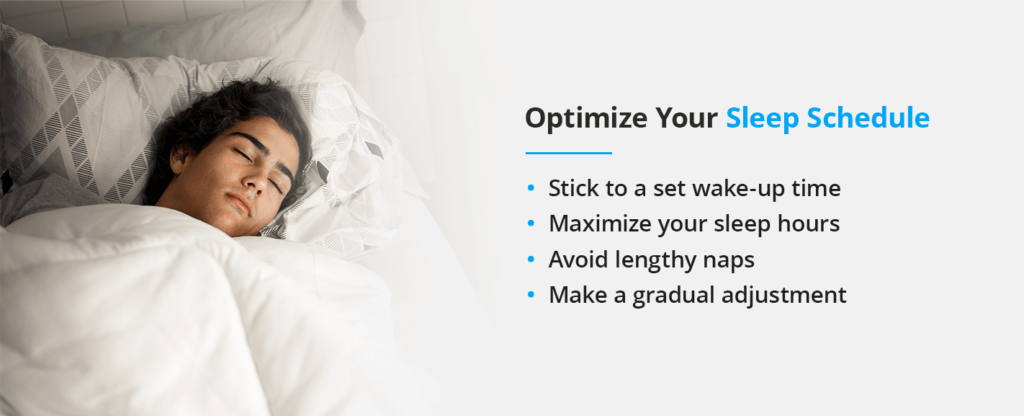Good sleep habits can promote a better night’s rest and do wonders for your mental and physical health. Despite the well-established importance of sleep hygiene, many people find themselves lacking good quality sleep.
While there are several causes and risk factors associated with insomnia or trouble falling asleep, there are also many ways to promote a healthier night’s rest. Learn more about the importance of sleep, how to improve your sleep schedule and five tips for improving sleep hygiene below!
Why Is Sleep So Important?
Sleep is crucial for our health and well-being. It’s as essential as eating, drinking and breathing! Yet, 40 million people in the United States struggle with sleep disorders today.
Sleep hygiene refers to the habits that can help you fall asleep and stay asleep. When you have good sleep hygiene, you can gain benefits like these:
- Reduces stress: Sleep is a powerful stress-reliever. Cortisol is our body’s main stress hormone. Lack of sleep is associated with higher levels of cortisol, and more stress and anxiety. When we work on our sleep habits, we can regulate our moods and reduce stress. Good sleep hygiene is also associated with sharpened attention and better decision-making.
- Helps you maintain a healthy weight: When we sleep, our body regulates hormones responsible for hunger and appetite. By getting a good night’s sleep, these hormones can stay balanced so we’re only hungry or full at the appropriate times, ensuring we stay at a healthy weight.
- Improves mental health: Studies have shown that lack of sleep can contribute to mental illness and exacerbate symptoms. In fact, many people with mental health issues also suffer from sleep problems. By getting a good night’s rest, you can reduce symptoms of mental illness, such as paranoia or hallucinations, and promote better mental health.
- Strengthens memory: Sleep serves as an opportunity for our minds to process stimuli we’ve taken in during the day and strengthens the neural connections in our brain that help us form memories. By winding down at the end of a long day and getting a full night’s rest, we can remember past events more clearly and help our brains remember new memories.
Tips for Improving Sleep
Now that you understand the importance of sleep hygiene, it’s essential to learn how to improve your sleep habits for a healthier mind and body.
Here are five tips for better sleep:
1. Optimize Your Sleep Schedule
One of the best ways to get better sleep is to take control of your sleep schedule. To harness this schedule to your benefit, try the following strategies:
- Stick to a set wake-up time: Get yourself accustomed to a schedule by waking up at the same time every morning. This means sticking to your schedule even on weekends or days you’d be tempted to sleep in.
- Maximize your sleep hours: If you’re hoping to get the recommended seven or more hours of sleep each night, build that into your schedule. Identify a target bedtime to achieve this and give yourself time before bed to wind down and sleep.
- Avoid lengthy naps: Be cautious about taking too many naps at the incorrect time of the day — you won’t want to throw off your sleep schedule! The National Sleep Foundation recommends napping shortly after lunch for around 20 minutes. Avoid napping after 2 p.m., as that can make it harder to fall asleep later.
- Make a gradual adjustment: Like any habit, establishing a sleep schedule takes time. Make minor adjustments to get your body used to your new schedule so you can achieve adequate sleep every night. You might start by going to bed half an hour earlier for a few days, then add another half-hour.
2. Design a Sleep-Inducing Bedroom
Ensure a good night’s rest by making your bedroom a quiet space for tranquility and comfort. Minimize distractions and maximize comfort with these tips to improve your sleep environment:
- Choose quality bedding: Ensure your bed is cozy and inviting with the right sheets, pillows and blankets. Choose bedding that is soft to the touch and will keep a comfortable temperature throughout the night.
- Cultivate quiet: Shutting your bedroom door and silencing your devices can keep your room quiet. If you need noise to sleep, use a white noise machine or fan for a gentler background sound. You can also prevent abrasive sounds from interrupting your sleep with earplugs designed for nighttime use.
- Determine a pleasant temperature: Ensure your bedroom temperature won’t be a distraction to falling asleep. While the ideal temperature varies between individuals, research says a cooler room between 60-67 degrees is conducive to better sleep.
3. Follow a Pre-Sleep Routine
What you do in the hours leading up to bedtime significantly matters when it comes to falling and staying asleep. Signal to your brain that it’s time for bed by creating a pre-sleep routine:
- Give yourself 30 minutes to wind down: Put your mind and body at ease so you’re ready for sleep. Try relaxation techniques, reading or even working on a puzzle to get into the right mindset for sleep.
- Lower the lights: Avoid bright lights and help your body produce melatonin, a hormone that contributes to sleep.
- Turn off electronics: Disconnect from your phone, laptop or tablet to relax your brain since these devices can suppress melatonin. Try to avoid electronics for at least 30 minutes before bed.
4. Craft Pro-Sleep Habits During the Day
While we can get better sleep by shifting our night schedules, we can also do so by changing our behaviors and routines throughout the day. Try these healthy habit changes:
- Get some sunshine: Since exposure to light controls our circadian rhythm, it only makes sense to take time every day to safely bask in the light. Doing so after lunch in place of a nap can help improve your sleep.
- Exercise: Get your body moving throughout the day to get better sleep at night, but avoid vigorous exercise close to bedtime.
- Avoid smoking: Studies have shown that smoking or exposure to smoke can cause sleep problems.
- Reserve your bed for sleep: Maintain a strong mental connection between your bed and sleep by reserving it for nighttime instead of using it also as a place to eat or work.
5. Maintain a Healthy Diet
Keep up a healthy and well-balanced diet to improve sleep quality and achieve better overall health. Follow a few nutritional tips for better sleep quality:
- Avoid eating late.
- Eat more fruits and veggies to get sufficient vitamins and nutrients.
- Be cautious with alcohol, which can disturb sleep.
- Avoid too much caffeine.
- Incorporate lean meats and high-fiber foods.
- Avoid foods high in carbohydrates.
Pursue Mental Health Treatment With MVPsych in MA
While it may seem overwhelming to implement each and every strategy, there’s no one-size-fits-all approach when it comes to good sleep hygiene. You can try all or just a few of these tips to maximize your sleep and improve your health.
And if you find your sleep problems are causing or worsening a mental illness, it can be helpful to reach out to professionals. The clinicians at Merrimack Valley Psychological Associates in Andover, Massachusetts, strive to provide expert, compassionate care to address your concerns. If you need stress management help so you can get better sleep or if other mental health services could benefit you and your sleep hygiene, we’re here for you.
To learn more about our services or schedule an appointment, contact us today.



